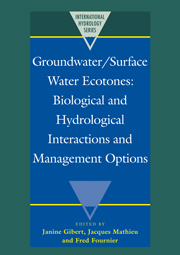Book contents
- Frontmatter
- Contents
- List of authors
- Preface
- I INTRODUCTION
- II FUNCTION OF GROUNDWATER / SURFACE WATER INTERFACES
- III MALFUNCTION OF GROUNDWATER / SURFACE WATER INTERFACES: CAUSES AND METHODS OF EVALUATION
- IV MANAGEMENT AND RESTORATION OF GROUNDWATER / SURFACE WATER INTERFACES
- V CONCLUSION
- ANNEX
- Round Table 1: Riparian vegetation and water quality improvement
- Round Table 2: Biodiversity in groundwater/surface water ecotones: central questions
- Round Table 3: Modelling of flows at the interface
- Round Table 4: Contribution of the groundwater/surface water ecotone concept to our knowledge of river ecosystem functioning
Round Table 5: Groundwater/surface water interface and effective resource management
Published online by Cambridge University Press: 07 September 2010
- Frontmatter
- Contents
- List of authors
- Preface
- I INTRODUCTION
- II FUNCTION OF GROUNDWATER / SURFACE WATER INTERFACES
- III MALFUNCTION OF GROUNDWATER / SURFACE WATER INTERFACES: CAUSES AND METHODS OF EVALUATION
- IV MANAGEMENT AND RESTORATION OF GROUNDWATER / SURFACE WATER INTERFACES
- V CONCLUSION
- ANNEX
- Round Table 1: Riparian vegetation and water quality improvement
- Round Table 2: Biodiversity in groundwater/surface water ecotones: central questions
- Round Table 3: Modelling of flows at the interface
- Round Table 4: Contribution of the groundwater/surface water ecotone concept to our knowledge of river ecosystem functioning
Summary
The scientific community is increasingly interested in becoming involved in management of groundwater resources and of related surface water and riparian ecosystems impacted by groundwater/surface water interactions. Researchers want more control over how the results of their work are applied and they want to be more involved in the important task of environmental protection. They also want to have more influence on research funding. In fact, many scientists feel their involvement is necessary for their work to continue receiving support and funding. This new involvement of researchers is welcomed by enlightened water resources managers. Managers are under increasing pressure to balance protection policies with an array of other needs. They realize that the most effective management must be based on the best scientific information. Because of these factors, scientists are more frequently devoting a portion of their programmes to management issues (Stanford & Simons, 1992). However, groundwater management is complex, dealing with scientific as well as social, economic and political issues. There are many problems that make solutions difficult, and progress is often slow. In spite of this, scientists and managers must continue to push for a more co-ordinated approach because protection of our vital groundwater resources needs the involvement of everyone who can help.
GOAL STATEMENT
To base the management of groundwater resources on the best available scientific information in order to achieve maximum ecological benefits. By doing this, groundwater will also be protection as a safe source of drinking water.
A list of actions is needed in order to achieve this goal, and how these actions could be implemented. These actions are really the basis for developing a strategic plan of action.
- Type
- Chapter
- Information
- Groundwater/Surface Water EcotonesBiological and Hydrological Interactions and Management Options, pp. 243 - 246Publisher: Cambridge University PressPrint publication year: 1997
- 1
- Cited by

